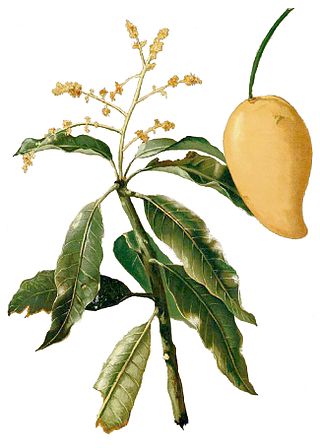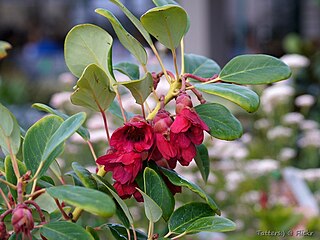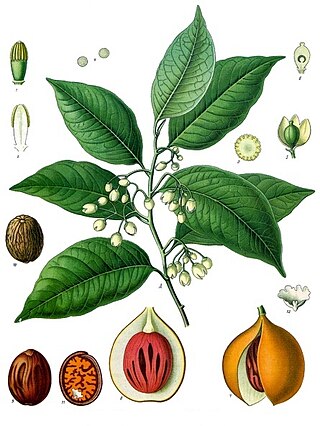
The Chinese pond heron is an East Asian freshwater bird of the heron family, (Ardeidae). It is one of six species of birds known as "pond herons". It is parapatric with the Indian pond heron to the west and the Javan pond heron to the south, and these three are presumed to form a superspecies. As a group they are variously affiliated with the squacco heron or the Malagasy pond heron. As of mid-2011 there are no published molecular analyses of pond heron interrelationships and osteological data is likewise not analyzed for all relevant comparison taxa.

Pinus hwangshanensis, or Huangshan pine, is a species of pine endemic to the mountains of eastern China; it is named after the Huangshan Mountains in Anhui, from where it was first described.

Quercus dentata, also called Japanese emperor oak or daimyo oak is a species of oak native to East Asia. The name of the tree is often translated as "sweet oak" in English to distinguish it from Western varieties. It is placed in section Quercus.

The large-spotted civet is a viverrid native to Southeast Asia that is listed as Endangered on the IUCN Red List.

The Korean hare is a species of hare native to the Korean Peninsula and adjoining parts of northeastern China. The Korean hare inhabits diverse habitats within its range, from remote mountain forests to cultivated land. Fur colour varies slightly among individuals, but is generally some shade of liver brown.

Pinus massoniana is a species of pine, native to Taiwan, a wide area of central and southern China, and northern Vietnam.

Tickell's bat is a species of vesper bat. It can be found in Bangladesh Bhutan, Cambodia, possibly China, India, Myanmar, Nepal, Sri Lanka and Thailand.
Aiphanes lindeniana is a species of palm that is endemic to Colombia. Although widespread in the Cordillera Occidental and Cordillera Central, it is threatened by habitat loss and forest management practices.

Horsfield's shrew is a species of mammal in the family Soricidae found in Cambodia, China, India, Japan, Laos, Nepal, Bhutan, Sri Lanka, Taiwan, Thailand, and Vietnam.

The Yunnan hare is a medium-sized species of mammal in the family Leporidae. It has soft, flat, and long dorsal pelage which is grayish brown or dark gray in color, and whitish ventral pelage. It was considered endemic to China, but its presence was recorded in northern Myanmar in 2000. It is a herbivore, and forages on shrubs and forbs. It is rated as a species of least concern on the IUCN Red List of Endangered Species. The Red List of China's Vertebrates has listed the Yunnan hare as near threatened, almost meeting the criteria to be listed as vulnerable.
Halesia macgregorii is a species of flowering plant in the family Styracaceae. It is endemic to southeastern China, where it grows at moderate altitudes of 700–1,200 m. It is threatened by habitat loss. Recent genetic evidence suggests it is probably more closely related to the genus Rehderodendron than to other species of Halesia; it may be transferred to that genus in the future.
Ligustrum pricei is a species of Ligustrum, native to China and Taiwan, where it occurs at 900–1700 m altitude.

Chionanthus ramiflorus, commonly known as northern olive or native olive, is a species of shrubs and trees, of the flowering plant family Oleaceae. They grow naturally in India, Nepal, northeastern Australia (Queensland), New Guinea, the Philippines, southern China and Taiwan.

Mangifera sylvatica, also known as the Himalayan mango, pickling mango, or Nepal mango, is a species of plant in the family Anacardiaceae. It is found in Bangladesh, Cambodia, China (Yunnan), India, Myanmar, Nepal, Bhutan and Thailand. It is a tree 6–20 m (20–66 ft) tall. The fruit measure 6 cm–8 cm × 4 cm–5 cm.

Rehderodendron macrocarpum is a species of flowering plant in the family Styracaceae, native to southwestern China and northern Vietnam, where it grows at altitudes of 1,000–1,500 m. It is threatened by habitat loss.

Rhodoleia championii, the Hong Kong rose, is a species of plant in the family Hamamelidaceae. It is a small evergreen tree with dangling scarlet flowers that are pollinated primarily by birds, and is found in China, Indonesia, Malaysia, Myanmar and Vietnam.

Salix magnifica is a species of willow in the family Salicaceae. It is endemic to Sichuan in southwestern China, where it grows at high altitudes of 2,100–3,000 m above sea level. It is threatened by habitat loss.

Myristica fragrans is an evergreen tree indigenous to the Maluku Islands of Indonesia. It is important as the main source of the spices nutmeg and mace. It is widely grown across the tropics including Guangdong and Yunnan in China, Taiwan, Indonesia, Malaysia, Grenada in the Caribbean, Kerala in India, Sri Lanka and South America.
The pygmy bamboo bat is a species of vesper bat in the family Vespertilionidae. It is found in Southwest China and was discovered in 2007. The species is around 4 cm (1.6 in) long and weighs between 2.6 and 3.5 g.

Eucommia is a genus of small trees now native to China, with a fossil record that shows a much wider distribution. The single living species, Eucommia ulmoides, is near threatened in the wild, but is widely cultivated in China for its bark, and is highly valued in herbology such as traditional Chinese medicine.

















